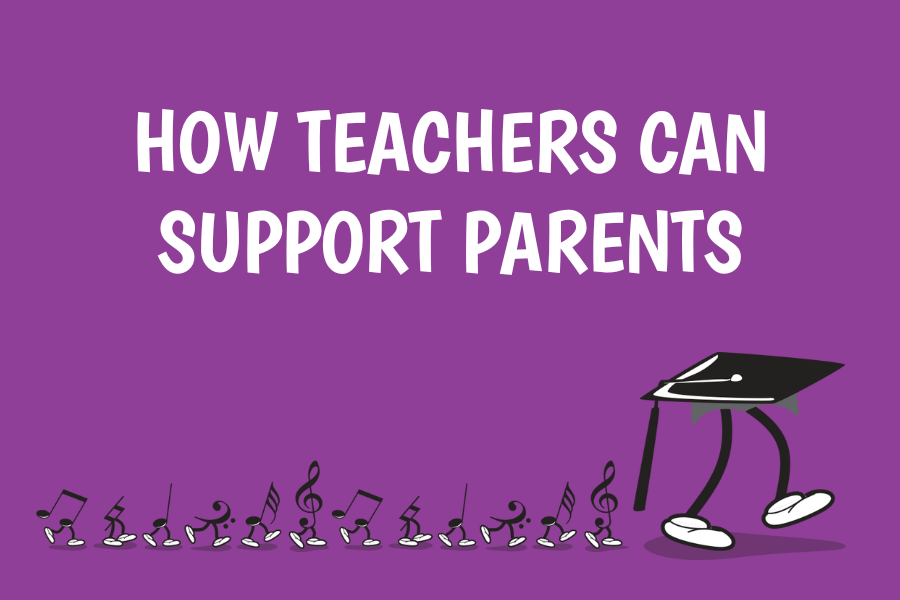How Teachers Can Support Parents

Recently I had the pleasure of presenting to a large audience of piano teachers, as part of the official Pizza, Pinot and Pedagogy event 1 that was held on the last night of the recent APPC conference.
The teachers found it quite relaxing to be offered a glass of wine at the end of a full day of sessions, and then to settle in for yet another one, before getting free pizza! 2 This also made for a wonderful positive vibe in the room, which helped enormously when the technology failed and I had to talk with no PowerPoint slides for a while. 😊
The topic I had chosen to speak on was ‘The Role of the Parent in a Successful Practice Routine’. I had prepared slides about positive and negative motivation loops, matrices about practice and support, and tables showing skills learned v time invested in practice. But there was also something more – embedded in this presentation was the idea that whilst parents need to support their children, we teachers need to support the parents.
I was planning to ask some pointed questions and hoped that the responses would prove certain points I wanted to make. But since it was the first time I had presented this talk, I wasn’t 100% sure it would work. 3
I began the presentation by asking whose parents had enrolled them in piano lessons prior to the age of 5. About 20% of the room raised their hands. I then asked who started between the ages of 5 and 10 years – now about ¾ of the room said yes. So that meant that the majority of us had all been practising piano from a very young age (and it was also a very predictable demographic).
So, now it was time to ask the question I had been preparing for months, the one I had never before asked. I knew the response I was hoping for, but really had no idea what it would be, so my heart was beating wildly.
The question was:
“How many of you remember EVER being reluctant to practice?”
And the response?
The entire room raised their hands.
Oh boy was I delighted! I asked everyone to look around and take in this data, because it’s the perfect thing to be able to say to our studio parents. When their children inevitably baulk at practice, we can tell them that it is perfectly NORMAL – and that in fact, we piano teachers can ALL remember feeling the same way!
Later on I asked another question, once again feeling a bit nervous about what would happen. I asked how many of us had musician parents.
About a third of the room raised their hands. 4
So this proved another point! Being supportive is completely independent from being musical. The vast majority of us had non-musician parents, but we all managed to get to a very advanced level. Yet again, I asked everyone to remember this response and describe it to studio parents. Musicians evolve in supportive environments, not exclusively musical environments. Otherwise two-thirds of the room would not have even been at my presentation, and I wouldn’t have even been presenting it! 5
Now, the question of HOW parents can best support their budding young musicians comes down to a lot of communication and education from us, the teachers. What are the main disruptors of practice? What constitutes a practice routine? What does it mean to be supportive? During the presentation I referred to some of the many blogs I’ve written on this topic:
Top 10 Reasons Why Kids Don’t Practice – BlitzBooks
The Progress Matrix: Making Parents Responsible – BlitzBooks
Why Students are Practising Less – BlitzBooks
I concluded the talk with an extended analogy on what it’s like to support practice and why piano playing is like learning to ride a bike. During question time, I was asked ‘Will you create a Blitz Book of Parent Education’? 😊 Whilst this is tempting, it turns out I don’t need to. My great friend and amazing colleague Leila Viss has already done it.
I’m so glad to have been able to give this presentation, and to have received such great feedback. The topic seemed to resonate hugely with every demographic of teacher in the room, from young teachers just starting out, to the veteran teachers who have been teaching for 60+ years. No matter what level of piano we teach, we all have the responsibility of supporting, communicating with and educating our studio parents – helping them to create a culture in which music education is as valued as any other activity.
- I have been holding these PPP events at my home since July 2023. There are usually 20-30 teachers in attendance. This was a record-breaking crowd of 135! 😊
- This also meant that dinner was sorted and everyone could then race off to the evening concert. Always helpful.
- I was taking a risk that I know no lawyer would ever take!
- I did not raise mine. My dad and my grandmother had piano skills, but neither of them ever helped me practice.
- In fact, sometimes having musical parents can backfire. I asked the teachers: Who had musician parents in their studio who were ‘not exactly helpful’? Lots and LOTS of hands went up.

That was a lovely post, and it was spot-on when it comes to not liking to practice. It’s not easy, and our brains don’t like hard things. Thanks so much for sharing the details of your session. I like how you get to your point by asking questions many had not considered before. Always so innovative! A huge thank you for linking my resource! I’m honored. Made my day 🥰
And your comment made mine! 😀